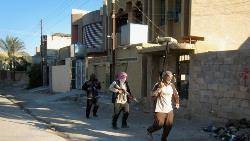Violence in Iraq's Sunni-dominated Anbar province, where armed groups fully control one city and parts of another, has displaced up to 300,000 people in six weeks, the United Nations has said.
The province has been hit by a surge in fighting between pro- and anti-government forces that began at the end of last year, as Iraq suffers its worst violence since 2008.
"Over the last six weeks up to 300,000 Iraqis - some 50,000 families - have been displaced due to insecurity around Fallujah and Ramadi" in Anbar, a UN refugee agency statement released on Tuesday said.
"Most of the displaced have fled to outlying communities in Anbar province to escape the fighting, while 60,000 persons have fled to more distant provinces," according to the statement summarizing remarks by spokeswoman Melissa Fleming in Geneva.
The displaced Iraqis join more than 1.1 million compatriots who fled violence in past years and have still not returned to their homes.
The UN said last month the number of people displaced by the fighting in Anbar was already the highest since the brutal sectarian violence of 2006-2008.
The crisis in the western desert province erupted in late December with clashes in the Ramadi area when security forces dismantled Iraq's main Sunni-Arab anti-government protest camp, which was near the city.
With Iraq's once-Sunni minority accusing the Shia-led government of Nouri al-Maliki of discrimination, Sunni armed groups exploited the political rift and subsequently seized parts of Ramadi, the provincial capital, and all of Fallujah to its west, just a short drive from Baghdad.
It is the first time anti-government forces have exercised such open control since the peak of the deadly violence that followed the 2003 US-led invasion.
Anbar Governor Ahmed al-Dulaimi at the weekend gave fighters in Fallujah a week to surrender, but said authorities would not negotiate with those involved in the violence.
While government forces have made steady progress in retaking areas of Ramadi, they have largely stayed out of Fallujah for fear that an incursion would lead to a drawn-out urban conflict with high numbers of casualties.
Fallujah was a bastion of the Sunni insurgency following the invasion, and American forces there saw some of their heaviest fighting since the Vietnam War.
There have been calls for the Shia-led government to address Sunni grievances in order to undermine support for fighters, but with April elections looming, Prime Minister al-Maliki has taken a hard line.
PHOTO CAPTION
A file photo of masked anti-government gunmen hold their weapons as they patrol Fallujah, Iraq.
Source: Aljazeera.com


 Home
Home Discover Islam
Discover Islam Quran Recitations
Quran Recitations Lectures
Lectures
 Fatwa
Fatwa Articles
Articles Fiqh
Fiqh E-Books
E-Books Boys & Girls
Boys & Girls  Hajj Rulings
Hajj Rulings Hajj Fatwas
Hajj Fatwas














